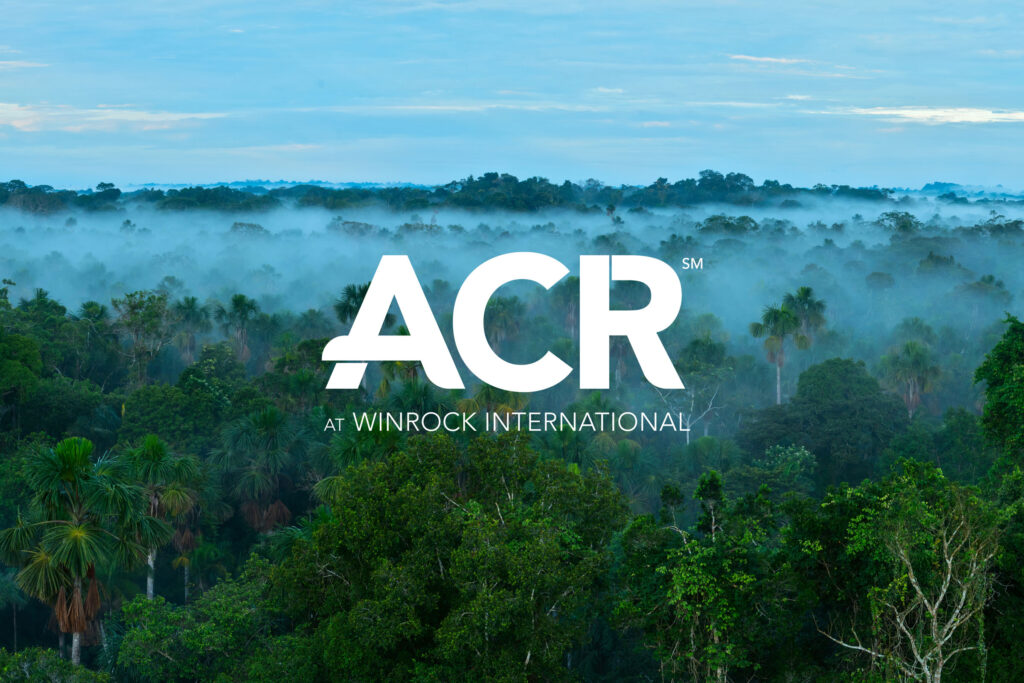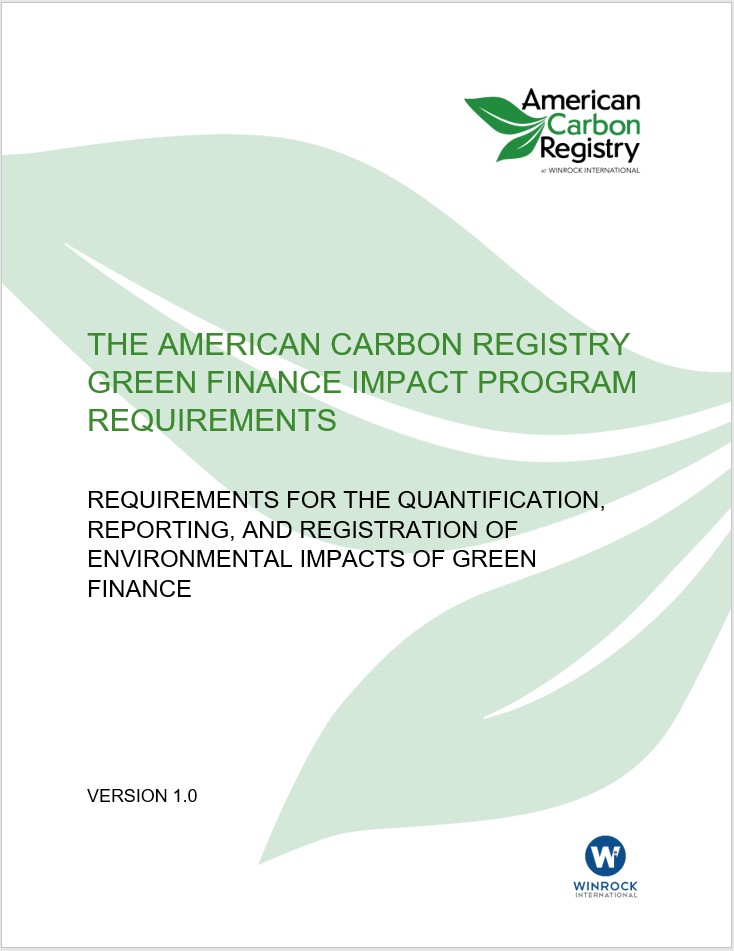
Resource
ACR Capital Markets

U.S. municipalities are increasingly turning to the green bond market to raise capital for infrastructure with climate and other environmental benefits. As the market has grown, so too have investor demands for greater impact disclosure in the form of quantified metrics.
ACR’s Green Finance Impact Program seeks to deliver on investor demands and further mobilize capital markets to fill the multi-trillion-dollar investment gap in sustainable public infrastructure. ACR’s transparent and evidence-based approach to demonstrating the environmental benefits of green finance results in standardized, normalized, and quantified environmental key performance indicators (KPIs) that allow for meaningful comparison across projects and bond issuances. The Program advances multiple goals:
Enhances the Capacity of Issuers to:
- Quantify the environmental impacts of bond issuances;
- Compare planned approaches to maximize benefits; and
- Effectively and confidently communicate environmental impacts to stakeholders.
Empowers Investors and Underwriters to:
- Access environmental KPIs from a trusted source;
- Elevate the consideration of environmental impact in decision making; and
- Assess impact over time at the project, asset, and bond levels.
The Green Finance Impact Program offers a suite of products for use by municipal issuers, investors, underwriters, and other market participants. These include:
Green Finance Impact Methodologies quantify relevant and project-specific environmental KPIs using consistent and transparent approaches. The methodologies calculate indicators appropriate to the project type and contain U.S. specific benchmarks that are used to compare impacts relative to a representative standard of performance.
Calculator Tools are easy-to-use, online calculators that embed the equations found in the methodologies and translate project specific user inputs into environmental KPIs and comparable outputs.
The methodologies and calculator tools:
- Build upon broader efforts to harmonize impact reporting in the green bond market by quantifying core indicators proposed in other frameworks and providing guidance on how to apply these in the U.S. municipal context.
- Provide ex-ante estimates in advance of project implementation and ex-post assessments to support issuers’ ongoing tracking of project performance.
Green Finance Impact Registry Platform displays the results from the ACR methodologies and calculator tools via an online interface that enables discovery of environmental impacts of bond issuances. The Registry Platform displays:
- Bonds and associated projects with their environmental KPIs;
- Impacts relative to established benchmarks; and
- Other related climate and social impact disclosure information.
About Us
ACR is a nonprofit enterprise of Winrock International and a scientific standards body for the creation of environmental assets. This includes tradable assets like carbon offset credits issued by ACR Environmental Markets, and the quantification of environmental attributes of financial instruments by ACR Capital Markets.
Advisors: We are honored to welcome an esteemed group of investors, public officials, academics, and attorneys as members of ACR’s Green Bond Advisory Council:
- Felix Amerasinghe, Finance Director at Zap Energy
- Zach Baumer, Climate Program Manager in the Office of Sustainability at the City of Austin
- Michael Eckhart, Visiting Clinical Professor for Sustainable Finance, University of Maryland
- R. Andreas Kraemer, Founder and Director Emeritus of Ecologic Institute
- Susan Mac Cormac, Corporate Partner, Chair of Social Enterprise and Impact Investing Group, and Co-Chair of Energy and Cleantech Group at Morrison & Foerster LLP
- Ian Parker, Managing Director of U.S. Municipal Finance, West Coast Infrastructure, Multifamily, and Project Finance at RBC Capital Markets
- Tim Schaefer, Deputy State Treasurer in the Office of the California State Treasurer
- Ashley Schulten, Managing Director and Head of Responsible Investing for Global Fixed Income at BlackRock
Funders: We are grateful for the financial support provided by the Rockefeller Brothers Fund, the Tides Foundation, the Samuel Freeman Charitable Trust, and other charitable donors.
Background
It has been estimated that it will cost nearly $6 trillion to bring U.S. infrastructure into a state of good repair by 2029. While the need is significant, so are the potential financial, environmental, and community benefits of these investments. The municipal debt markets are an avenue for financing the necessary investments to make U.S. infrastructure greener and more resilient to climate change.

The rapidly growing green bond market has financed projects across multiple sectors, including clean transportation, water and wastewater management, renewable energy and energy efficiency, green buildings, and waste management, as well as supporting climate change adaptation. As the green bond market has grown, investors have sought increased impact disclosure and standardization.
- The Green Bond Principles promote integrity in the green bond market through voluntary process guidelines that recommend transparency, disclosure, and reporting. The Green Bond Principles promote harmonized impact reporting and call for the use of quantitative performance measures and additional initiatives to help further establish impact reporting.
- The California State Treasurer’s Office spearheaded a five-city listening tour in collaboration with the Milken Institute that resulted in a call for greater standardization, disclosure, and reporting.
- The green bond market’s lack of enforceable, widely accepted definitions and ground rules raises costs and slows market development.Good disclosure and reporting is the best way to ensure market integrity, allowing investors to perform their own due diligence.
- Issuers should provide qualitative descriptions of each project plus quantitative estimates of greenhouse gas reduction.
- The Milken Institute recommended concrete actions to grow the green bond market in California and the United States.
- Standardize the metrics used to measure the environmental impact of various projects.
- Improve [issuer] data collection to meet growing demands.
- Set a minimum threshold for the market as a whole and establish key performance indicators within various categories of projects.
- Streamline data collection practices.
ACR’s Green Finance Impact Program responds to these calls by providing a standardized, evidence-based approach to impact quantification for green infrastructure financed with municipal bonds.
Program Requirements

The ACR Green Finance Impact Program Requirements is the governing document of the Program and its product and service offerings for the quantification, reporting, and registration of the environmental KPIs from green projects. It provides uniform criteria and processes that market participants must meet in order to utilize ACR-approved methodologies and calculator tools and register quantified environmental impacts on ACR’s Green Finance Impact Registry.
ACR aims to maximize flexibility and usability for issuers while maintaining the scientific rigor and environmental integrity necessary to ensure that quantification of environmental benefits is evidence based and transparent. Adherence to the Requirements, ACR-approved methodologies, and impact disclosure templates will ensure that impact reporting is standardized, comparable, and offers a reasonable representation of the relevant environmental outcomes and social impacts from the bond proceeds – thereby establishing a quantitative demonstration of expected and assessed project benefits that are compelling to, and trusted by, investors and other market entities.
ACR Green Finance Impact Program Requirements
Resources
ACR-approved Green Finance Impact Methodologies and Calculator Tools are the basis for quantifying the environmental impacts of bond-financed green projects. The Green Finance Impact Program is focused on project types relevant to the municipal markets and ACR is actively expanding its catalog of methodologies.
Available Methods
- Green Building Projects: New Construction and Major Renovations
- Diversion of Organic Waste for Anaerobic Digestion Projects
- Diversion of Organic Waste for Composting Projects
*Calculator Tools are password protected. Email ACRCapitalMarkets@winrock.org to request access.
Pilot Project Case Studies
ACR partners with municipalities to conduct pilot projects and present case studies on the use of the Green Finance Impact Methodologies.
Get Involved
ACR is actively engaging with U.S. municipal bond issuers to pilot our methods and guidance to ensure they are effective and practical to use. If your organization is interested in joining us as a pilot partner or you just want to learn more, send an email to ACRCapitalMarkets@winrock.org.
If ACR has not yet published a methodology for a particular municipal project, asset, or activity type, ACR will consider methods developed by external authors for approval through our methodology proposal and development process. Interested parties can send an email to ACRCapitalMarkets@winrock.org.
©2020-2021 AMERICAN CARBON REGISTRY at WINROCK INTERNATIONAL. All Rights Reserved.
All content included in or made available through this website, including text, images, logos, graphics, videos, downloadable files, and data compilations is the exclusive property of AMERICAN CARBON REGISTRY at WINROCK INTERNATIONAL (“ACR”) and is protected by U.S. and international copyright and trademark laws. Any content contained herein may not be copied, distributed, downloaded, modified, reused or reposted, except as permitted herein, without the express written permission of ACR. This website and any iteration of content contained in these materials that is accessible electronically may be used and/or downloaded solely for the purpose of quantification and evaluation of the environmental impacts of bonds conducted as part of the ACR Green Finance Impact Program. You may not mirror or frame this website for rebroadcast or for any other purpose, or otherwise alter any files or content of this website. The unauthorized use or misuse of ACR intellectual property, including trademarks, copyrights, and content contained here, except as permitted, is expressly prohibited and may be a violation of intellectual property laws and common law. Except as expressly provided above, nothing contained on this website shall be construed as granting or conferring any license or right to use any ACR copyright, patents, or trademarks. Any request to license all or any portion of the content herein must be in writing, submitted to: Licensing Requests, American Carbon Registry c/o Winrock International, 2451 Crystal Drive, Suite 700, Arlington, VA 22202.
